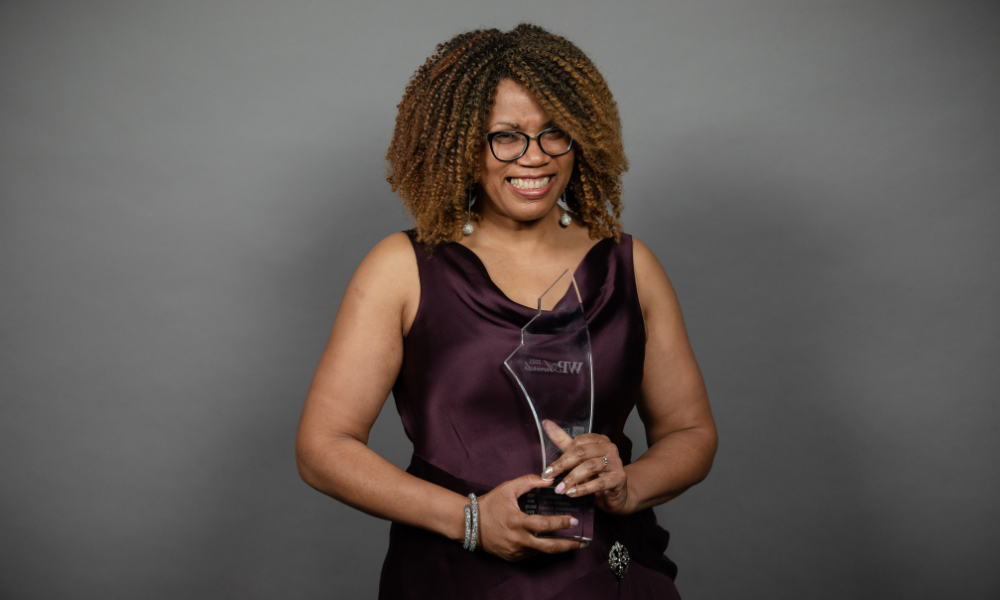Award-winning advisor says these communities are good at saving, but need to become good at investing

With advice flying at us from every corner of our physical and digital worlds, financial advisor Jackie Porter believes we need professional financial planners now more than ever.
Aiming to empower clients by helping them feel financially confident, Porter, an advisor at Carte Wealth Management, hopes her wins inspire others.
The 25-year veteran of the financial services industry won the Equiton Award for Canadian Advisor of the Year 2023, on June 1 at the ninth annual Wealth Professional Awards, making her a three-time recipient of a WP Award.
Carte Wealth Management was also recognized as one of the winners for The Best Wealth Management Firms in Canada. Read the full report here.
Of the win, she says, “It’s an honour for me and important for advisors to see people like myself. The more advisors that are diverse, the more we can serve the clientele that’s out there. I hope it inspires more people of colour to know that they too can be in this scenario.”
Early in her career as a financial advisor, Porter was told, “You need your money to work for you - you build wealth by having your money multiply.” It’s this philosophy that has stayed with her and what she aims to help her clients achieve. Personalized support is what successful clients need from their advisors too – not just those with money struggles, she stresses.
“We talk a lot about people of colour that are not doing well, but there’s a huge thriving community; many immigrants who come here are doing very well. We need to do a better job of marketing to them, and identifying them, as nobody is really marketing to them.
“Immigrants and people of colour are really good at saving, but they need to become good at investing. Let’s look at how we can multiply your wealth rather than just add to it.”
Women in particular need customized planning that tracks their life changes, according to Porter. She says that in her experience, women are demanding answers to financial questions they may have been too scared to ask in the past. However, there are still some who don’t “want to look at their bank account statement, credit card statements, maybe even how your investments are doing.”
“But just to have a sense of how your net worth is growing, I think, would give women a lot more confidence than not knowing. Seeing how you’re progressing with paying down debt and taking control of where your money is going, versus where it just ends up. The more we do that - if we have children, we are better mentors to them.”
During the pandemic Porter actually saw a surge of clients streaming in, many of whom were unsure about estate planning. The advisor focuses on education and communication when facilitating discussions with families about next-generation planning, having everyone sit down and talk about their priorities and values.
The advisor asserts that in times when health problems such as COVID threaten financial security, people need an empathetic ear, “Do they want to have their hand held by a robot or by a human? Even untangling two people that are financially tangled, it’s not something a computer can do.”
Porter says that offering clear communication, attentive listening and tailored support means taking the time to address all her clients’ questions. That’s why she isn’t worried about the rise of AI, robo-advisors or even unlicensed TikTok ‘Finfluencers’ in the industry. Personal finance does not have cookie-cutter answers that a program can help resolve.
“Do you want to trust advice from someone who has absolutely no idea what your personal finances are? How can you trust advice that is mass-marketed? How can you use that to make a decision?” she asks, but adds, “It is worthwhile to engage with such content as it can start a conversation and can get people asking their advisors the right questions, such as, ‘Should I be listening to this?’ A financial Influencer is not your advisor.”
Porter believes the advisor of the future has to be aware of clients’ emotions surrounding their finances and the degree of therapy that is involved in the job. “Where advisors will be able to offer value is, strangely enough, being human again!”
Just as a doctor who sees and treats more patients of colour, is more adequately equipped to pinpoint medical issues more prevalent in those communities – diverse advisors can connect with diverse clients in a more impactful way. Porter sees taking care of her clients’ financial health as part of her job.
Looking at planning for the year ahead and the June interest rate increase, Porter says the latter was simply a necessary measure to deter people from taking on more debt. While rates were low, paying down debt was a lower priority, so it was a time to grow one’s money. Now that the rates are high, it’s time to exercise caution and to remain at a comfortable level of debt, she suggests.



